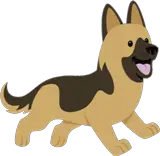Introduction
Welcome to our comprehensive guide about the Polish Hound, a breed of dog known for its exceptional tracking abilities and loyal disposition. While this breed may not be as familiar as the Golden Retriever or German Shepherd, it carries a rich history and a charming personality that are worth exploring. The Polish Hound, or Ogar Polski as it is known in its native land, has deep roots in Poland’s history. Developed as a scent hound, this breed has been used for centuries for tracking and hunting in the dense forests of Poland. Though its exact lineage remains a mystery, what we know for sure is that these dogs were bred to have exceptional stamina and tracking skills.
| Aspect | Details |
|---|---|
| Origin | Poland |
| Breed Group | Hound |
| Tamaño | Medium to Large |
| Weight Range | 55-70 lbs (Male), slightly less for Females |
| Height Range | 22-24 inches (Male), 20-22 inches (Female) |
| Duración de la vida | 10-13 years |
| Coat Type | Dense and Smooth |
| Coat Colors | Commonly black with tan markings, but also variations in brown, gray, and red |
| Temperamento | Intelligent, Calm, Social, and sometimes Stubborn |
| Exercise Needs | Alto |
| Aseo | Low to Moderate |
| Dieta | A balanced diet rich in proteins, carbohydrates, vitamins, and minerals |
| Preocupación por la salud | Potential for Hip Dysplasia and Ear Infections |
| Best Suited For | Active families with large outdoor spaces |
Physical Characteristics of the Polish Hound
Description of Appearance
The Polish Hound is a medium to large breed with a robust and well-muscled body. It is well-known for its expressive eyes, long droopy ears, and a thick tail that often curls upwards.
Size and Weight Ranges
Males typically stand 22 to 24 inches tall at the shoulder, while females stand 20 to 22 inches. As for weight, males usually weigh between 55 to 70 pounds, and females weigh slightly less.
Variaciones de color
Their coats are dense and smooth and come in a variety of colors. The most common is black with tan markings, but you’ll also find variations in brown, gray, and red.
Lifespan and Health
The Polish Hound is generally a healthy breed with a lifespan of 10-13 years. However, like all breeds, they are prone to certain health conditions, which we’ll cover in more detail later on.
Temperament and Personality Traits of a Polish Hound
General Temperament
Polish Hounds are known for their intelligent and calm demeanor. These dogs are not just trackers; they are also fantastic family companions.
Social Behaviors with Humans and Other Animals
Polish Hounds get along well with humans and can be good with other dogs and animals if properly socialized from a young age.
Unique Traits and Quirks
One charming quirk about this breed is their vocal nature. Polish Hounds have a unique howl that they use to communicate with their human families.
Behavioral Challenges and How to Manage Them
Some Polish Hounds may exhibit stubbornness or independence, which can be managed with consistent training and positive reinforcement.
Caring for a Polish Hound
Dietary Requirements
Polish Hounds, like most dogs, thrive on a balanced diet rich in proteins, carbohydrates, vitamins, and minerals.
Exercise Needs
These dogs are energetic and require regular exercise to keep them healthy and happy.
Grooming and Hygiene
The Polish Hound’s short, dense coat requires minimal grooming. Regular brushing can help keep the coat healthy and shiny.
Health Concerns Specific to the Breed
While Polish Hounds are generally healthy, they can be susceptible to certain breed-specific conditions like hip dysplasia and ear infections. Regular check-ups with a vet can help identify and manage these conditions early on.
Training a Polish Hound
General Training Approach
Polish Hounds are intelligent and generally responsive to training. However, their independent nature may require a little extra patience.
Specific Training Tips for the Breed
Training should be firm but positive. Polish Hounds respond best to reward-based training methods.
Common Behavior Issues and Training Solutions
Stubbornness can be a challenge with this breed. Consistent, positive reinforcement can help mitigate this trait.
Socialization Needs
Socializing your Polish Hound from a young age is crucial. It can help them get along well with other animals and people.
Living with a Polish Hound
Adaptability to Different Living Conditions
While they can adapt to various living conditions, Polish Hounds thrive in homes with large outdoor spaces where they can exercise their tracking instincts.
Compatibility with Children and Other Pets
With proper socialization, Polish Hounds can get along well with both children and other pets.
Daily Activities and Engagement
Engaging activities, like tracking games or agility, can provide mental and physical stimulation for your Polish Hound.
Where and How to Get a Polish Hound
Breeder Information
Always ensure that you are purchasing from a reputable breeder who provides health clearances for both puppy’s parents.
Rescue Organizations and Adoption
Rescue organizations and adoption centers can be a good source for finding Polish Hounds in need of a loving home.
Considerations When Choosing a Polish Hound
Consider your lifestyle and whether you can meet the exercise and socialization needs of a Polish Hound before deciding to bring one into your home.
Expected Costs
The cost of a Polish Hound will vary based on factors such as breeder location, pedigree, and the level of care provided to the puppies before purchase.
Famous Polish Hounds and Their Stories
Known Polish Hounds in History or Popular Culture
While there may not be many famous Polish Hounds in popular culture, this breed has a long history of being esteemed hunting companions in Poland.
Stories of Exceptional Polish Hounds
There are countless stories of Polish Hounds showcasing their incredible tracking skills, from hunting in the forests of Poland to finding lost items for their owners.
The Role of Polish Hounds in Hunting
Polish Hounds have traditionally been used in hunting due to their excellent tracking abilities. With their superior sense of smell, these dogs were often used to track down game in Poland’s vast forests. Their stamina and persistence make them adept at following a scent for long periods, often over great distances. These dogs are so skilled that they’re able to differentiate between individual animals’ tracks, ensuring that the same game can be followed even amongst numerous different tracks.
Adaptability to Weather Conditions
A notable aspect of Polish Hounds is their adaptability to various weather conditions. Originating from Poland, these dogs have experienced both the harsh, cold winters and the relatively warm summers. Their dense coat provides excellent insulation during colder months, while its shortness helps to somewhat alleviate the heat in the warmer season. However, regardless of their adaptability, it’s essential to provide them with adequate shelter and care during extreme weather conditions.
Polish Hounds as Therapy Dogs
The calm and amicable nature of Polish Hounds has also made them excellent candidates for therapy and assistance work. Their sensitivity to human emotions, combined with their natural inclination towards companionship, allows them to provide comfort to people who need it. Whether it’s visiting hospitals, or care homes, or serving as a companion for those with special needs, Polish Hounds have proven to be exceptional therapy dogs.
Conclusión:
With their tracking prowess, loyal disposition, and amicable nature, the Polish Hound is a unique breed that can make both an excellent working dog and a loving family companion. If you have the time and space to meet their exercise needs, and you are looking for a loyal and intelligent companion, the Polish Hound could be the perfect addition to your family.


